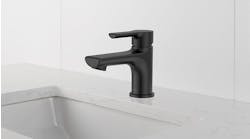Latest from Hydronics
Sponsored
Innovative Tankless Technology Creates Affordable Water Heating Solution
When constructing a home for your customers, the cost of water heating appliances and the product’s installation may come up in conversation. They may ask for your recommendation on whether to install a tank versus a tankless water heater. And during this important conversation is where a common myth associated with tankless water heaters may influence decisions: Tankless water heaters are expensive to purchase and install.
Year over year, we’ve seen tankless installations and products become more affordable, especially non-condensing units. When comparing costs of tank vs. tankless, it’s important to note that non-condensing tankless water heaters have become comparable in price with standard tanks. When looking at gas water heater price examples online, a non-condensing tankless water heater can be found as low as $700, while tanks are priced at around the same. This price change is due to the increasing cost of manufacturing materials as a result of the current economic climate and supply issues seen across the globe.
But another reason for the product’s affordability has derived from newer, smarter and more innovative tankless technology, which has improved the efficiencies of the product and cost of ownership.
Cost efficiency of tankless units
There are a lot of other attributes associated with tankless technology, including the cost-efficiencies it provides homeowners, such as increased energy efficiency, water savings and product durability. All add up to an affordable water heating solution.
Energy efficiency: New technologies, such as Rinnai’s recently launched RE Series™, featuring Smart-Circ™ Intelligent Recirculation™, can predict homeowners’ hot water needs. Through smart recirculation, energy is conserved by scheduling hot water delivery based on past usage versus having it on a mode that circulates at regular time intervals. This benefit ensures the pump doesn’t waste energy by running during off-times when hot water is not being used. For comparison, common residential tanks have a thermal efficiency of around 60-65% whereas non-condensing tankless units are around 85% thermally efficient, using less fuel and energy to function.
- Water savings: The established recirculation patterns of a tankless unit help customers save on water use. With hot water scheduled to be available when needed, it reduces the amount of cold water wasted, as end users will no longer have to turn on a faucet, shower or tap and wait for the cold water to reach the desired temperature. And less money going down the drain.
- Longer durability: According to the Department of Energy, the typical lifespan of a standard tank ranges from 10 to 15 years, whereas a tankless water heater can last up to 20 years. Your customers won’t need to replace an entire tank every decade, but instead own a durable product where key components of a tankless water heater can be easily replaced, extending its lifespan even further.
Affordable Installation
New and innovative technologies have impacted the cost of tankless water heaters for the better, but they have also reduced the time spent on installations, which has decreased the overall cost for your customer. For example, the RE series offers concentric venting solutions for non-condensing units, where only one penetration in a wall or ceiling is required. This eliminates the time and money needed for two penetrations and two sets of venting materials for intake and exhaust. And additional time and money are saved, as a dedicated return line isn’t necessary for the recirculation technology. A thermal bypass valve can be used, which allows water already in the system to recirculate through the cold-water line back to the tankless water heater for heating, enabling faster hot water regardless of plumbing configuration.
As we’ve progressed in innovative tankless technology, so has the number of installers. There are significantly more PROs trained and experienced in installing tankless water heaters today than there were ten years ago. Well-trained professionals can reduce labor costs for your customers as they can reduce the amount of time required to complete the job.
With improved technologies, positive impacts have been made on the cost of tankless water heaters. Tankless water heaters are not expensive but provide an affordable water heating solution. To learn more about the RE Series, visit www.rinnai.us.
David Federico is Senior Director of Marketing at Rinnai America Corporation with primary responsibilities for leading the marketing strategy for its residential and commercial products. Before joining the organization in 2016, David held marketing leadership positions at multinational corporations including Georgia-Pacific. David is a graduate of Georgia State University with a bachelor's degree in Business Administration - Marketing.
Sponsored By:



